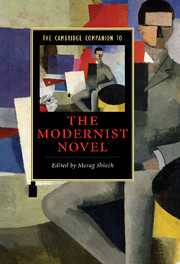1 - Modernists on the art of fiction
Published online by Cambridge University Press: 28 July 2007
Summary
Between the 1880s and the 1930s, a new and fertile discourse on the art of fiction emerged alongside the extensive reshaping of fictional form itself. This interweaving of critical and creative activities typifies the self-consciousness we have come to find in modernism across all the arts. Manifestos, declarations, excurses and rationales are the inevitable accompaniments to modernist experimentation, just as reflexivity becomes lodged in the grain of the artwork: the Cézanne canvas cannot fail to be about the discourse of painting as much as it is about the pursuit of natural phenomena; the Imagist poem, stripping itself of the trappings of the 'poetical', succeeds in this very gesture in foregrounding the discourses of poetry. In the case of the art of fiction, the very use of the term 'art' is an emergent sign of this new self-consciousness.
It is important to recognize the influence of a particular historical context of aesthetic theory and practice, drawn mainly from France and Russia, in the development of Anglo-American modernist fiction, ranging from Gustave Flaubert’s expressed desire to write a novel about nothing, to the coruscating naturalism of Emile Zola and the psychological intensities of Fyodor Dostoevsky. Through this context the idea of the modern novel comes to occupy a complex space bounded by the principles of abstraction on the one hand and realism on the other.
This essay presents a brief comparative survey of six representative writers and selected key texts on the art of modernist fiction. I want to suggest how far, through a cluster of recurrent concepts - art itself, but also life, experience, the human, realism, morality, freedom, democracy, readers - the discourse on modernist fiction is fundamentally Janus-faced, looking simultaneously inwards, towards form and language, and outwards, towards the changing material circumstances in which fiction was being produced and consumed.
- Type
- Chapter
- Information
- The Cambridge Companion to the Modernist Novel , pp. 15 - 31Publisher: Cambridge University PressPrint publication year: 2007
- 3
- Cited by

